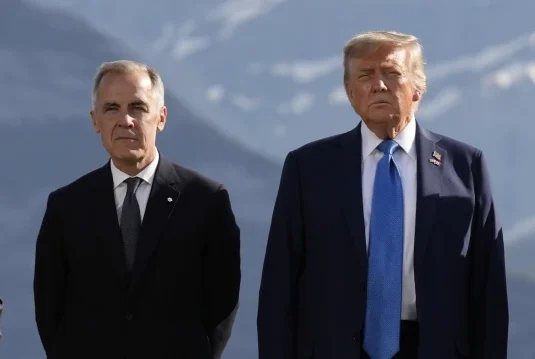Six of the Group of Seven leaders discussed Russia’s war in Ukraine and the Israel-Iran conflict on Tuesday but failed to reach major agreements on those and many other top issues.
Canadian Prime Minister Mark Carney and his counterparts from the UK, France, Germany, Italy and Japan were joined during Tuesday’s final sessions by Ukrainian President Volodymyr Zelenskyy and NATO chief Mark Rutte, reports AP.
“We need support from allies and I’m here,” Zelenskyy said, before adding, “We are ready for the peace negotiations, unconditional ceasefire. I think it’s very important. But for this, we need pressure.”
The remaining leaders agreed to jointly attempt to combat what they called non-market policies that could jeopardize global access to critical minerals. They also pledged to limit the downsides of artificial intelligence on jobs and the environment, while still embracing the potential of the “technological revolution.”
There was consensus on other issues, but though the summit was meant to showcase unity on top global concerns, no joint statement on the conflict in Ukraine was released.
In Trump’s absence, the remaining six leaders held an extensive session on Ukraine. Lacking unanimity, individual leaders also met with Zelenskyy to reassure him of their support.
The summit also was largely overshadowed by a showdown over Iran’s nuclear program that could escalate. Israel launched an aerial bombardment campaign against Iran, and Iran has hit back with missiles and drones.
French President Emmanuel Macron warned against the US and other powers pushing for regime change in Iran, suggesting it could destabilize the greater Middle East. “I believe the greatest mistake today would be to pursue regime change in Iran through military means, as that would lead to chaos,” Macron said.
Macron said Carney fulfilled his mission as G7 host by preserving the unity of the multilateral organization. “We shouldn’t ask the Canadian presidency to resolve every issue on earth today. That would be unfair,” said Macron, who will host the G7 next year.
Carney said in his final remarks Tuesday evening that Trump’s early exit was about the “extraordinary” situation in the Middle East, not anything that occurred during the summit. “Mr. Trump felt it was better to be in Washington, and I can understand that,” Canada’s prime minister said.
Carney said Canada would impose new economic sanctions against Russia and was releasing its own statement offering “unwavering support for a secure and sovereign Ukraine.” Asked if the US pushed to soften any possible joint statement from the gathered leaders on Ukraine, Carney said he consulted with Trump while preparing the language his own country used.
Still, Trump’s departure only served to heighten the drama of a world on the verge of several firestorms — and of a summit deprived early of its most-watched world leader.
However, his early departure from the G7 summit left things awkward; French President Emmanuel Macron tried to reframe the exit as strategic. “There is indeed an offer to meet and exchange,” Macron told reporters, suggesting the US might help broker a ceasefire between Israel and Iran.
But aboard Air Force One, Trump responded with a swipe that accused Macron of showboating. “Wrong! He is ‘publicity seeking’ and always gets it wrong,” Trump said in a post on his Truth Social site. The takedown punctured Macron’s narrative and revealed a rupture in their long-standing relationship.
Furthermore, concerns about the Russia-Ukraine war and little progress on the conflict in Gaza and now the situation in Iran have made things all the more tense — especially after Trump imposed severe tariffs on multiple nations that risk a global economic slowdown.
Members of Trump’s trade team remained in Canada to continue discussing tariffs, including Treasury Secretary Scott Bessent, who sat at the table as world leaders met with Zelenskyy.
Trump’s stance on Ukraine also put him fundamentally at odds with the other G7 leaders, who are clear that Russia is the aggressor in the war. The US declined to join new sanctions against Russia, with Trump saying, “When I sanction a country, that costs the US a lot of money, a tremendous amount of money.”
One bright spot for Trump during the summit came when he and British Prime Minister Keir Starmer signed a trade framework that was previously announced in May.


